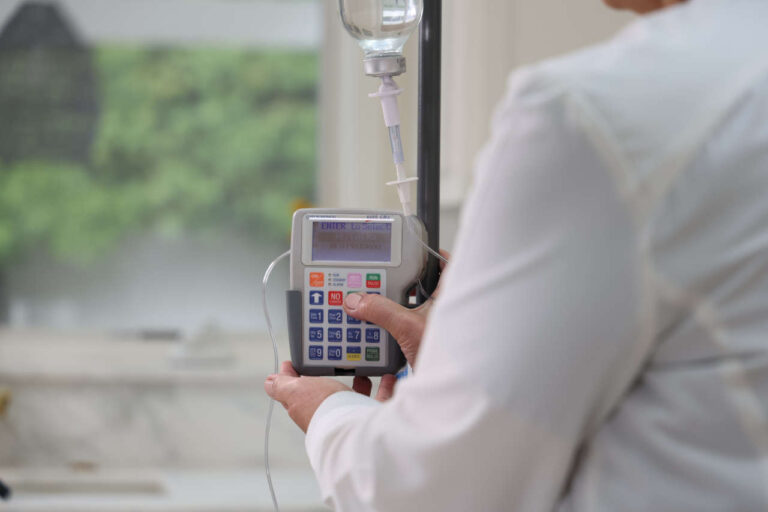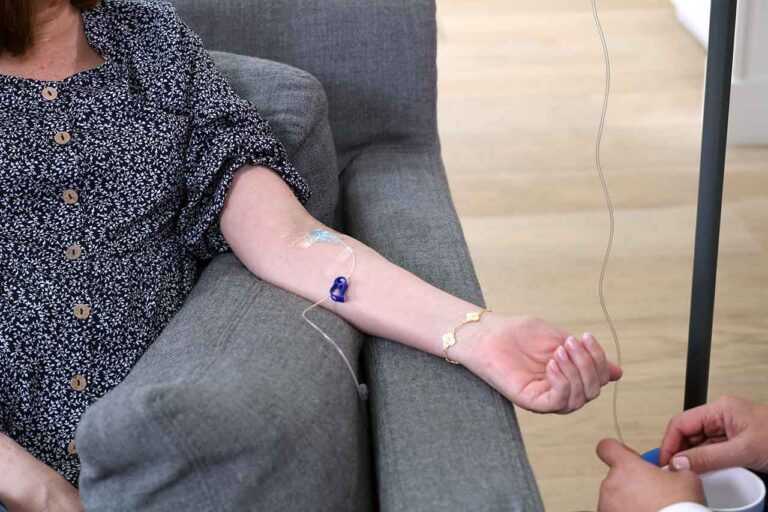
There are specific situations when you should avoid intravenous immunoglobulin (IVIG) therapy, or use it with caution. In this article, you will learn about IVIG contraindications and other related topics.
Treatment Info
Get IVIG Prior AuthorizationWhat Are Contraindications and Their Types?
A contraindication is a situation in which the use of a specific drug or medical procedure is inappropriate, potentially resulting in injury or life-threatening complications.
There are two categories of contraindications:
Relative contraindication
Relative contraindication pertains to situations in which a judicious approach is required when employing two medications or procedures concurrently. This type of contraindication can be deemed permissible when the advantages significantly outweigh the potential risks.
For example, due to potential fetal risks, physicians normally advise against using X-rays during pregnancy. However, in extreme circumstances, the use of X-rays may be explored.
Absolute contraindication
An absolute contraindication is when a particular medicine or procedure should be completely avoided. For example, pregnant women should not use isotretinoin (a drug to treat acne).
In addition to the primary medication, other components within the product could also provide a rationale for abstaining from its use.
IVIG Contraindication: What To Know?
There are no definitive contraindications for IVIG products [1].
However, it could be necessary to avoid using some treatment options because of your health or because of the specific ingredients. As a result, IVIG contraindications are tailored to the specific patient while also considering the product.
Many IVIG brands are available in the U.S.:
- Bivigam
- Carimune
- Flebogamma
- Gammagard S/D (low IgA)
- Gammagard Liquid
- Gammaked
- Gammaplex
- Gamunex
- Octagam
- Privigen
Below, we describe the contraindications common to all IVIG brands as well as those specific to one product or patient.
Common IVIG Contraindications
All IVIG products are contraindicated in two situations:
- In people with a history of severe, life-threatening reactions to human immunoglobulin.
- In IgA-deficient individuals with antibodies to IgA and a history of hypersensitivity.
Product-Specific IVIG Contraindications
- Octagam contains maltose, a sugar obtained from corn. Consequently, if you have a corn allergy, it is advisable to refrain from consuming Octagam.
- It is advised to avoid using Gammaplex if you have a hereditary fructose intolerance.
- Infants and neonates with no established sucrose or fructose tolerance should not receive Gammaplex.
Patient-Specific IVIG Contraindications
- People with renal failure or diabetes should not take sugar-stabilized IVIG products.
- Post-transplantation patients should not receive hyperosmolar IVIG products.
Individuals with heart disease or hypertension should exercise caution when consuming products that are high in sodium content.
Get IVIG Copay Assistance
IVIG Financial AssistanceIs IVIG Contraindicated in Sepsis?
No. A 2022 study concluded that IVIG therapy could be an option to treat people with sepsis and low IgG levels [2].
Is IVIG Contraindicated in Pregnancy?
Pregnancy is not an absolute IVIG contraindication. Therefore, if the benefits of an IVIG treatment far outweigh any possible hazards, pregnant women may want to go ahead with treatment. A 2021 study that was published in the “American Journal of Reproductive Immunology” states that there is no increased risk of injury to the mother or the fetus when IVIG is used during pregnancy [3].
Does IVIG Interfere With Vaccines?
IVIG may potentially interact with certain vaccines. It is important to notify your healthcare provider about your IVIG treatment before getting vaccinated.
For example, children getting IVIG treatment should not receive the MMR vaccine since IgG can decrease the vaccine’s effectiveness. Experts advise delaying immunization for at least nine months after IVIG therapy.
Little to no interaction occurs between IVIG and the following vaccines [4]:
- Inactivated vaccines
- Live oral vaccines (rotavirus, oral typhoid vaccines)
- Live intranasal vaccine (live attenuated influenza vaccine)
- Bacille Calmette-Guerin (BCG) vaccine
- Yellow fever vaccine
Little information is available about interactions between IVIG preparations and COVID-19 vaccines. However, IVIG is unlikely to affect COVID-19 mRNA vaccines [5]:
Authors of a 2023 study note that IVIG may benefit people with myositis and a higher risk of COVID-19 infection [6].
Can IVIG Be Given in Renal Failure?
Although there is a boxed warning about an increased risk of renal failure associated with all IVIG products, diminished kidney function is not a definitive cause to forego IVIG therapy.
REFERENCES:
- Arumugham VB, Rayi A. Intravenous Immunoglobulin (IVIG) [Updated 2023 Jul 3]. In: StatPearls [Internet]. Treasure Island (FL): StatPearls Publishing; 2023 Jan-. Available from: https://www.ncbi.nlm.nih.gov/books/NBK554446/
- Akatsuka, Masayuki et al. “Efficacy of Intravenous Immunoglobulin Therapy for Patients With Sepsis and Low Immunoglobulin G Levels: A Single-Center Retrospective Study.” Clinical therapeutics vol. 44,2 (2022): 295-303. doi:10.1016/j.clinthera.2021.12.008
- Han, Aera et al. “Maternal and fetal safety of intravenous immunoglobulin in women with reproductive failure.” American journal of reproductive immunology (New York, N.Y. : 1989) vol. 86,6 (2021): e13492. doi:10.1111/aji.13492
- Government of Canada. Blood products, human immunoglobulin and timing of immunization: Canadian Immunization Guide. https://www.canada.ca/en/public-health/services/publications/healthy-living/canadian-immunization-guide-part-1-key-immunization-information/page-11-blood-products-human-immune-globulin-timing-immunization.html
- Svačina, Martin K R et al. “Antibody response after COVID-19 vaccination in intravenous immunoglobulin-treated immune neuropathies.” European journal of neurology vol. 29,11 (2022): 3380-3388. doi:10.1111/ene.15508
- Bae, Sangmee Sharon et al. “Assessment of antibody levels to SARS-CoV-2 in patients with idiopathic inflammatory myopathies receiving treatment with intravenous immunoglobulin.” Rheumatology international vol. 43,9 (2023): 1629-1636. doi:10.1007/s00296-023-05350-1













